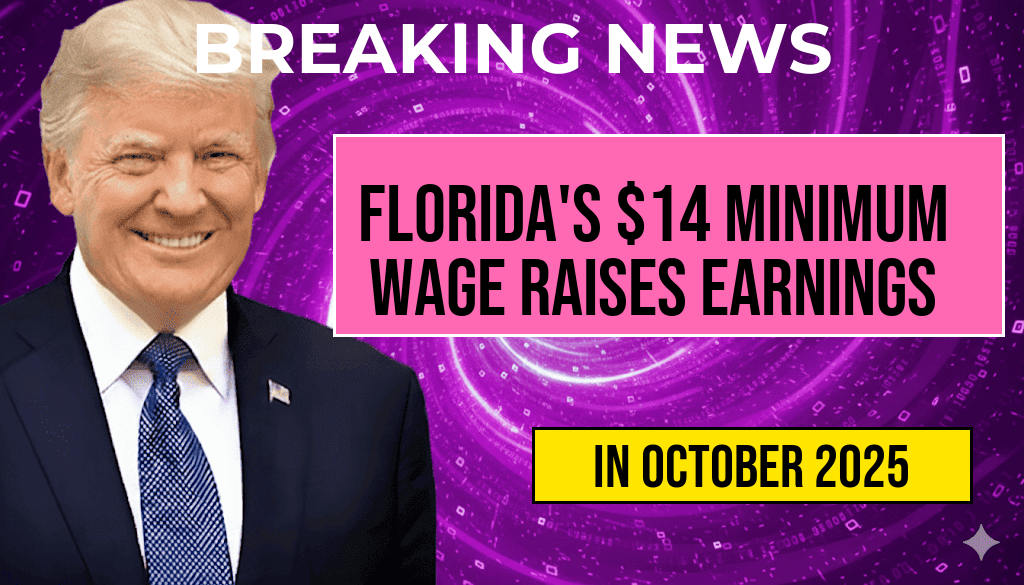Florida’s recent decision to raise the minimum wage to $14 per hour marks a significant milestone for workers across the state. Effective immediately, this increase is expected to elevate the annual earnings of full-time workers by approximately $2,080. The new wage is part of a broader initiative to enhance living standards for low-income earners, especially in a state where the cost of living has continually risen. Advocates for the wage increase argue that it is a vital step in addressing income inequality and ensuring that workers can meet their basic needs. This adjustment not only impacts individual workers but also has the potential to stimulate the local economy as households gain more purchasing power.
Details of the Minimum Wage Increase
The Florida minimum wage increase is being phased in as part of a constitutional amendment passed by voters in 2020. The amendment mandates annual wage increases until the minimum reaches $15 per hour by 2026. Below is a summary of the wage increase schedule:
| Year | Minimum Wage |
|---|---|
| 2021 | $10.00 |
| 2022 | $11.00 |
| 2023 | $12.00 |
| 2024 | $13.00 |
| 2025 | $14.00 |
| 2026 | $15.00 |
Impact on Workers and Local Businesses
The increase to a $14 minimum wage is anticipated to benefit over 1 million Floridians who earn minimum wage or slightly above it. For many full-time workers, this translates to an additional $2,080 annually, which can significantly improve their quality of life. The extra income can help cover essential expenses such as housing, food, and healthcare, which have become increasingly burdensome in Florida’s competitive market.
However, the wage increase has raised concerns among some small business owners. Critics argue that higher labor costs may lead to reduced hiring or even layoffs. Many small businesses, particularly in the hospitality and retail sectors, operate on thin margins, making it challenging to absorb increased payroll expenses. Some business owners may respond by raising prices, which could affect consumers.
Support from Labor Advocates
Labor organizations and advocates for economic justice have welcomed the wage increase, emphasizing its role in combating poverty. They argue that raising wages not only benefits workers but also fosters a healthier economy. When workers earn more, they have greater disposable income to spend on local goods and services, which in turn can help stimulate job growth.
- Florida Policy Institute: Advocates point to studies indicating that higher minimum wages correlate with lower rates of poverty and increased consumer spending.
- National Employment Law Project: The organization highlights that states with higher minimum wages often experience stronger economic growth.
Future Projections and Considerations
Looking ahead, as Florida progresses toward the $15 minimum wage by 2026, ongoing discussions about the balance between fair wages and business sustainability will be crucial. Policymakers will need to consider the evolving economic landscape, including inflation and the cost of living, to ensure that wage increases remain effective in improving workers’ lives without stifling business growth.
As the state implements these changes, monitoring the economic outcomes will be vital. Observers will be analyzing data on employment rates, business closures, and consumer spending to assess the long-term effects of the minimum wage increase. The outcome of this policy will likely serve as a case study for other states considering similar measures.
For more information on the minimum wage in Florida and its implications, you can visit Forbes or check the details on Wikipedia.
Frequently Asked Questions
What is the new minimum wage in Florida?
The new minimum wage in Florida has been set at $14 per hour.
How much will full-time workers earn annually after the wage increase?
Full-time workers can expect an increase in their annual earnings by $2,080 due to the minimum wage boost.
When did the new minimum wage take effect?
The new $14 minimum wage took effect on January 1, 2023.
How does the minimum wage increase affect part-time workers?
While the focus is on full-time workers, part-time workers will also benefit from the $14 minimum wage, receiving higher hourly pay as well.
What are the future plans for minimum wage increases in Florida?
Florida has plans to gradually increase the minimum wage to $15 per hour by 2026, following a set schedule of annual increases.

Leave a Reply